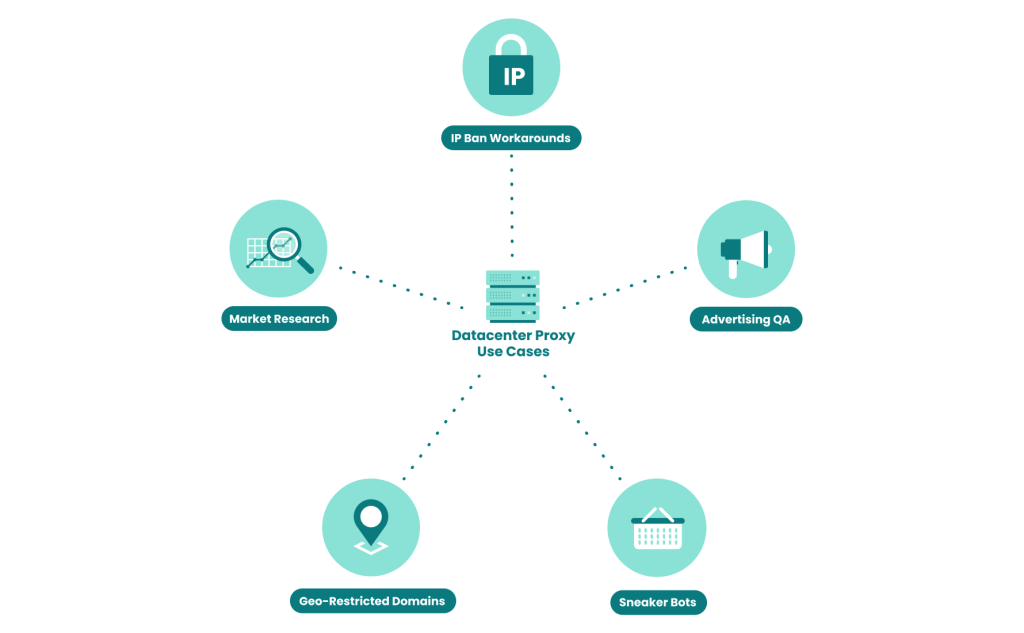
Datacenter proxies act as intermediaries, shielding your online identity and enabling access to restricted content. However, datacenter proxies may not offer the highest level of anonymity. This guide explores their benefits, like affordability and speed.
Read on to understand if datacenter proxies are the right tool for your needs.
A Quick Refresher: What are Datacenter Proxies?
For those new to the concept of proxy servers, especially datacenter proxies, here’s a succinct primer.
Proxy servers act as middlemen between your devices and the broader internet. Every device is allocated an IP address, which online platforms and services use to distinguish one device from another—be it a laptop, smartphone, desktop, or any device among the multitude out there.
Like any computing hardware connected to the internet, proxies also possess their own IP addresses. This is crucial because when your device’s internet traffic passes through a proxy server, the original IP address of your device is substituted with that of the proxy server before it proceeds to the internet. This process effectively shields your online identity from potential prying eyes and various tracking mechanisms.
Datacenter proxies are those housed within data centers. They benefit from the robust infrastructure of these centers, offering significantly enhanced bandwidth and access to a vast array of IP addresses. With this context, we’ll delve into the myriad advantages datacenter proxies offer.
In case you’re stuck finding reputable proxy services that offer datacenter proxies, we can help you with a few starters:
- IPRoyal: This provider boasts a massive pool of ethically sourced residential and datacenter proxies, offering a perfect blend of anonymity and performance.
- Smartproxy: Known for its user-friendly interface and cost-effective plans, Smartproxy is a great choice for users seeking a balance between affordability and functionality.
- Bright Data: If you require a comprehensive proxy solution with advanced features like real-time data collection, Bright Data is a powerful option to consider.
The Pros of Datacenter Proxies
The primary benefit of utilizing datacenter proxies lies in their versatility for a wide array of tasks. While certain specific benefits might be surpassed by more niche proxy types—for instance, the higher level of anonymity provided by residential proxies—datacenter proxies excel in offering a balance of affordability and reliability unmatched by other options.
- Extensive IP selection. Datacenter proxies provide access to a broad spectrum of IP addresses, invaluable for circumventing IP-based restrictions, navigating geo-blocks, or sidestepping rate limiting on various websites. This vast selection is also crucial for tasks like data mining and content aggregation.
- Efficiency in data mining. Datacenter proxies are particularly adept at extracting large quantities of public and semi-public data efficiently. Their cost-effectiveness, combined with a wide selection of IP addresses, makes them ideal tools for accessing region-specific information.
- Stellar performance and dependability. Thanks to the high-grade infrastructure of data centers, these proxies boast impressive uptime, speed, and stability in connection, ensuring a seamless internet experience.
- Cost-effectiveness. The market is replete with economical datacenter proxy options. Their affordability stems primarily from the scalable infrastructure of data centers and the common practice of sharing a single proxy among multiple users, except in the case of exclusive, dedicated datacenter proxies.
The Cons of Datacenter Proxies
Despite the many benefits, datacenter proxies have certain drawbacks that might make them less suitable for specific applications:
- Lower Anonymity Levels. Compared to residential proxies, datacenter proxies generally offer lower levels of anonymity. Since they originate from data centers and not a residential ISP, they can be more easily identified and blocked by websites employing sophisticated detection methods.
- Risk of Shared IP Address Blacklisting. When using shared datacenter proxies, there’s a risk that the IP address may be blacklisted due to the actions of other users sharing the same proxy.
Datacenter Proxies vs. Residential Proxies
Residential proxies, leveraging real ISP-assigned residential addresses, stand out for their superior anonymity, making them less susceptible to detection and blocking by advanced website security systems (source).
This high level of discretion renders them perfect for tasks that require a stealthy online presence, such as bypassing geo-restrictions or managing multiple accounts, though they come with a higher cost and potentially less consistent performance.
In contrast, datacenter proxies, rooted in the vast infrastructure of data centers, excel in providing fast and reliable internet access at a more affordable rate.
However, their association with data centers often results in lower anonymity, as they are more easily identified by websites with sophisticated detection capabilities, making them less ideal for highly sensitive operations.
What to Look For In Proxy Services
Now that you understand the advantages and potential drawbacks of datacenter proxies, you might be wondering where to find reputable providers. Here are some key things to consider when choosing a datacenter proxy service:
- Proxy Pool Size and Location Variety. Look for providers offering a large pool of datacenter IPs spread across diverse geographic locations. This ensures you have ample options for bypassing geo-restrictions and accessing region-specific content.
- Performance and Uptime. Reliable datacenter proxies boast high uptime and fast connection speeds. Look for providers with a proven track record of robust infrastructure and minimal downtime.
- Pricing and Plans. Datacenter proxies are generally budget-friendly, but pricing can vary depending on factors like bandwidth allocation, dedicated vs. shared IPs, and the total number of IPs included in the plan. Choose a provider that offers flexible plans to suit your specific needs and budget.
- Security and Features. While datacenter proxies aren’t the most anonymous option, some providers offer additional security features like username/password authentication and rotating IPs to enhance your online protection.
- Customer Support. Opt for providers with responsive and knowledgeable customer support to assist you with any technical issues or questions you may encounter.
Conclusion
Datacenter proxies offer a balance of affordability, speed, and a vast IP pool, making them ideal for data mining, bypassing geo-blocks, and other tasks. However, they may not provide the ultimate anonymity of residential proxies.
Consider your needs: affordability and versatility? Datacenter proxies are a great choice. Top priority is complete anonymity? Residential proxies might be better.
Last Updated: March 21, 2024




















